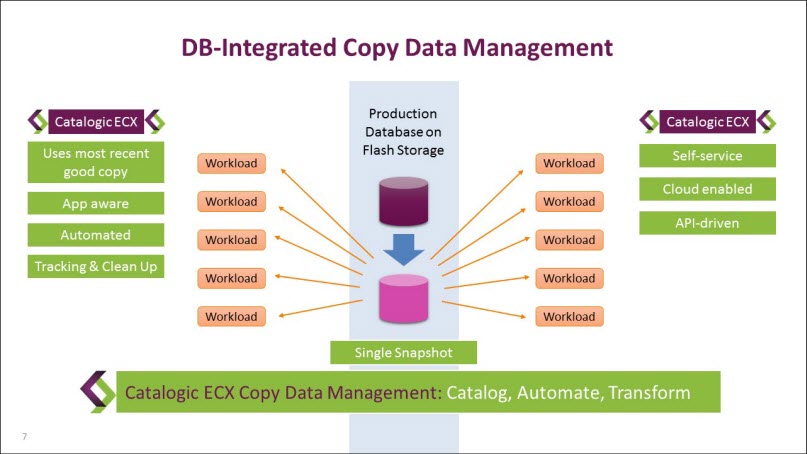 NEWS
NEWS
 NEWS
NEWS
 NEWS
NEWS
Catalogic Software Inc. has added support for Oracle and SQL databases to its ECX software-defined copy data management (CDM) platform, along with integration with EMC Unity flash and hybrid storage arrays and native support for Amazon Web Services (AWS). ECX 2.4 also deepens integration with the Puppet automation platform.
Catalogic claims to reduce enterprise storage costs by an average of 20 percent to 40 percent by automating copy management using the snapshot and replication technologies of existing storage and virtual infrastructure rather than dedicated equipment. ECX installs as a virtual machine or VMware Inc. vApp. With the exception of Oracle environments, the software is agentless. Administrators register the storage and hypervisor assets in ECX to get detailed visibility of all data, including copies.
ECX catalogs all snapshots, replicas and VMware objects, and understands the lineage and location of a data copies so that it’s clear what is production data, what is snapshot or replica data and which volumes the snaps and replicas are associated with.
ECX works with storage equipment from IBM, NetApp Inc. and now EMC Unity. The vendor says its approach not only reduces database sprawl but can create copies in environments in which databases need to remain continuously online and accessible.
Database sprawl is created when enterprises copy entire databases for use in disaster recovery, development, testing, application maintenance or analytics. International Data Corp. has estimated that as much as 60 percent of enterprise storage is consumed by copied data. Catalogic says it’s not unusual for enterprises to have more than 200 database instances and 10 copies of each database.
“Database environments are the worst offender when it comes to copy data management,” said Tom Grave, vice president of marketing.
The enhanced database features in ECX 2.4 — including data masking, integrated pre- and post-scripting and log management — use agentless technology to simplify the management, tracking and accessing of database copies. The software creates a single database snapshot from which storage administrators can create automated workflows for such uses as database recovery, disaster recovery, test, development and analytics without making full copies of the database.
Oracle is a particularly challenging environment because of the volatility of workloads, large data volumes and the need for continuous availability, Catalogic said. ECX injects and automatically manages lightweight application-aware agents into the Oracle servers. Customers can extend workflow scripts to customize each database instance and get detailed logs for reporting.
The addition of integrated AWS S3 storage support enables ECX copy policies to now be automatically directed to AWS S3 destinations, giving ECX customers the option to extend the management and use of data to the public cloud while maintaining full control and orchestration, Catalogic said.
On the DevOps side, ECX now has a plug-in for the popular Puppet automation toolset. “We made storage DevOps-ready so it can be made automatically available as a DevOps process,”Grave said. This enables Puppet users to use native commands to directly manage and deploy live operating environments that include the use of a copy of the relevant application. Pre-built, downloadable scripts and plug-ins now integrate the ECX RESTful API with Chef, Puppet and IBM UrbanCode DevOps tools. ECX is now available on the IBM Bluemix Garage as well.
Support our mission to keep content open and free by engaging with theCUBE community. Join theCUBE’s Alumni Trust Network, where technology leaders connect, share intelligence and create opportunities.
Founded by tech visionaries John Furrier and Dave Vellante, SiliconANGLE Media has built a dynamic ecosystem of industry-leading digital media brands that reach 15+ million elite tech professionals. Our new proprietary theCUBE AI Video Cloud is breaking ground in audience interaction, leveraging theCUBEai.com neural network to help technology companies make data-driven decisions and stay at the forefront of industry conversations.